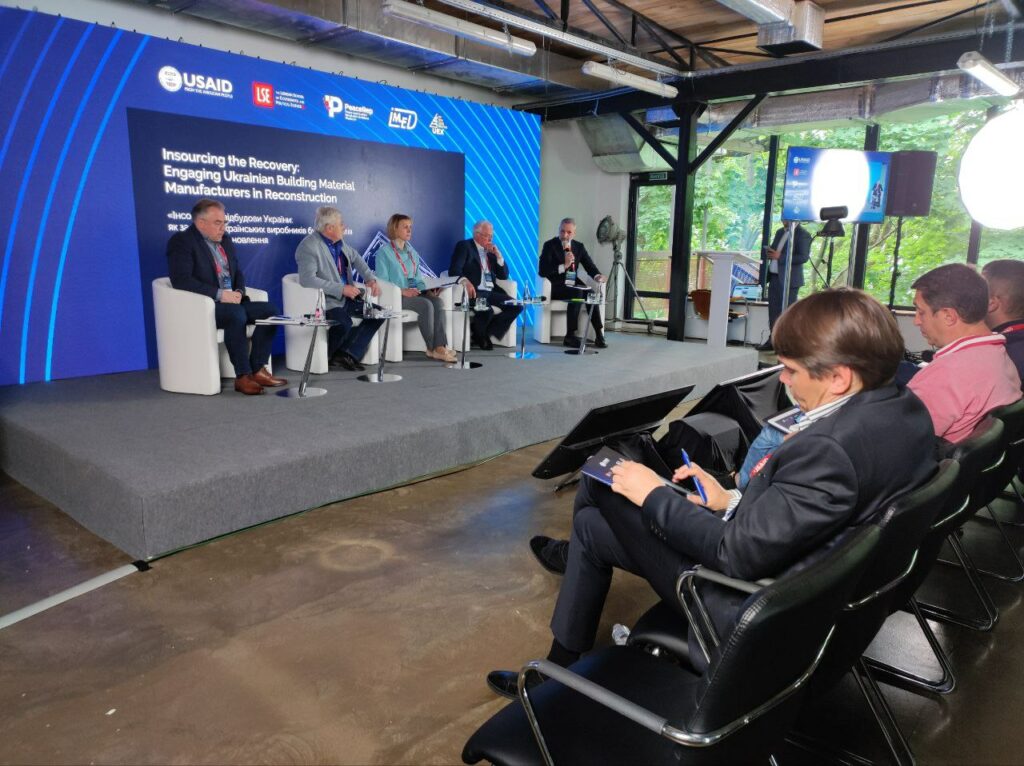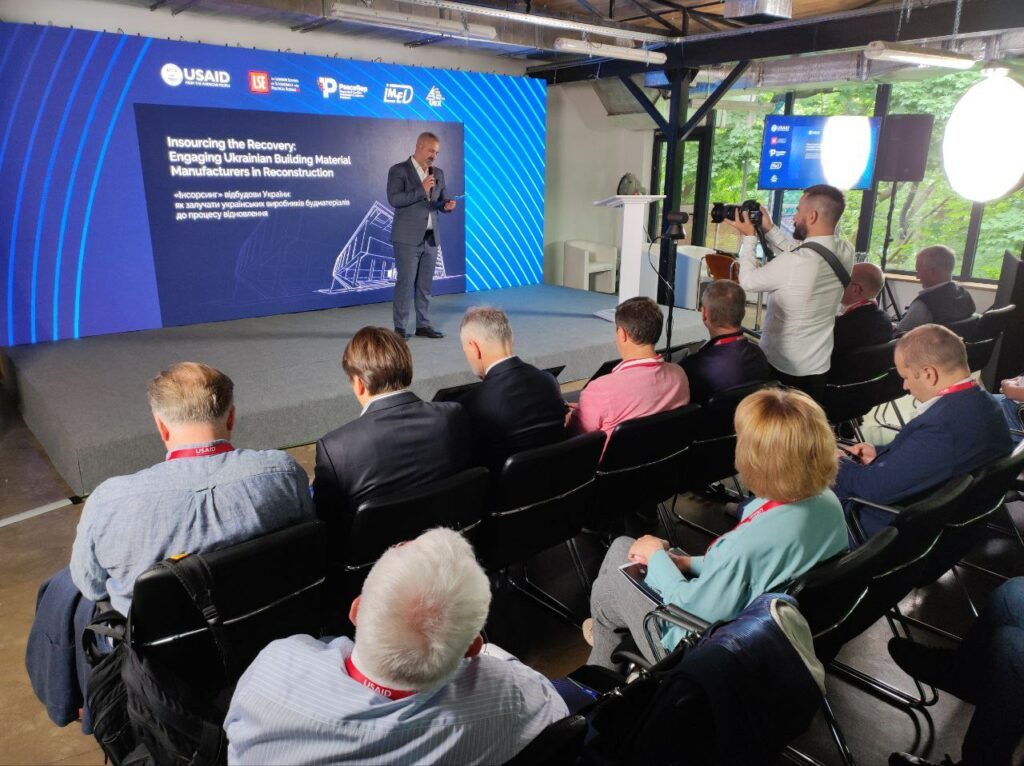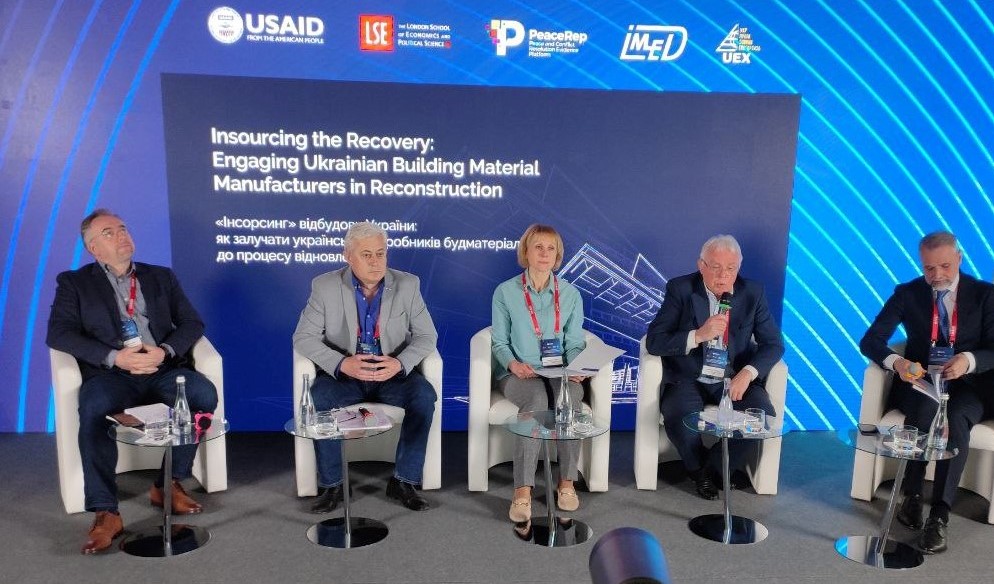On June 7, the conference “Insourcing the Reconstruction of Ukraine: How to Involve Ukrainian Manufacturers of Building Materials in the Reconstruction Process,” organized by the USAID Economic Resilience Activity (ERA), was held in Kyiv.
Representatives of government, businesses, donor organizations, and the banking sector took part in the conference to discuss the possibilities of restoring Ukraine through the maximum involvement of Ukrainian construction companies and to introduce donors and international financial institutions to manufacturers of construction materials who are seeking resources to increase their capacities to meet the construction needs.
The event was prompted by a study conducted by specialists of the State Enterprise Ukrainian Industry Expertise to find out the potential of the construction industry of Ukraine and the possible participation of manufacturers of construction materials in the reconstruction process. The most important conclusion is that Ukrainian companies can produce 90% of all construction materials.


The Director of Economic Growth, USAID Mission in Ukraine, Christopher Abrams, in addressing the participants of the conference, said that USAID supports the reconstruction of Ukraine’s economy, which should not only be restored but also become better after restoration.
The Head of the State Agency for Reconstruction and Development of Infrastructure of Ukraine, Mustafa Nayem, spoke about the importance of such a study. He noted that it showed that compared to other countries where there have been wars in recent years, the Ukrainian construction sector had preserved its potential, which must be used for economic recovery.
“Ukrainian manufacturers have potential, relevant experience, and standards, but now they do not have relevant orders, because the war continues. At the same time, it is important to realize that Ukraine does not produce some materials (cement, glass) or there is not enough of them, so we will be forced to import such construction materials”, said Mr. Nayem.
Director of the State Enterprise Ukrainian Industry Expertise Volodymyr Vlasiuk presented the results of the study conducted by his company.
“We tried to estimate the amount of construction materials that will be needed. As of November 1, 2022, the recovery needs amounted to $62 billion. For people to return from abroad, they need housing and work. Buildings will be rebuilt according to new projects and standards. That is, the destroyed “Khrushchivka”-type houses will be rebuilt in a new way. The recovery period generates a great demand for construction materials. Before 2022, 95% of construction materials were consumed in Ukraine. The construction materials sector is viable, there are personnel, although many people are now mobilized, defending the country at the front. The biggest challenges are access to loans, energy stability, and low consumer activity in the construction market. We do not produce glass, and there is not enough electrical equipment (panels), and cement. But 90% of construction materials can be produced in Ukraine. For this, it is necessary to combine the external economic efforts of diplomacy, the efforts of the sector in establishing contacts with donors, to create equal conditions for the competition of producers from Ukraine and Europe – all this will support the Ukrainian economy”, believes Mr. Vlasiuk.
The executive director of the UkrTsement Association Liudmila Kripka spoke about the need for maximum localization of the production of construction materials, and this will create jobs for people. She noted that currently, there are nine plants in Ukraine, eight of which are working, producing cement. Further, products supplied to Ukraine can cross the border without hindrance, but Ukrainian producers do not have this opportunity, and in other words, conditions for producers are non-competitive.
“The capacity of Ukrainian cement producers is 13 million tons per year. In 2021, they produced 11 million tons. Enterprises are ready to increase volumes. About 1 million tons are exported. We offer to support producers with preferential loans, to allow obtaining certificates on the basis of European ones. An independent laboratory is also needed, because usually these are laboratories at enterprises,” said Ms. Kripka.
The Head of the Association of Elevator Operators of Ukraine Serhii Horishnyi spoke about the challenges and opportunities for the production of elevators. He noted that currently, there are three elevator- producing factories in Ukraine that cover 50% of the need, and that more are needed, as these are all jobs.
“We need to ‘Ukrainianize’ the production of elevators, including its components. We import some components, because Ukraine does not produce them. There are ready-made elevators, but sometimes they are of dubious quality, much cheaper than Ukrainian ones. I draw attention to the responsibility of developers, becaus elevators need maintenance, because it is related to the safety of people who use them every day. As producers, we need cheap loans, specialists who will work in production, direct communication of all parties – both from the government and donors”, Mr. Horishnyi emphasized.
During the event, special attention was paid to financial resources for the development of the industry. The participants emphasized that it is necessary to involve both Ukrainian and international banks in this process, to make loans on preferential terms, so that manufacturers could pay them back in a timely manner, and this does not force them to increase the prices of the final products they manufacture.
Deputy Director of USAID ERA Brian Milakovsky summarized the event:
“We heard about the need for access to finance by Ukrainian manufacturers, because they are not equal for Ukrainian and European companies. Ukraine’s international partners should focus on this disparity in access to financing, which prevents Ukrainian manufacturers from strengthening their role in the country’s reconstruction. The question of the development of the workforce and its improvement is very important, so that it is not a shadow workforce, but officially employed people for whom employers pay taxes. We will continue to work to combine the efforts of interested producers and contribute to the economic recovery of Ukraine, because the sector has the potential to achieve this.”
The conference participants will draft their proposals into one document and plan to further communicate with interested parties (manufacturers, diplomats, donors) in order to draw the attention of the global community to the fact that Ukraine can handle the production of a large volume of construction materials in order to restore the economy after victory is attained.




